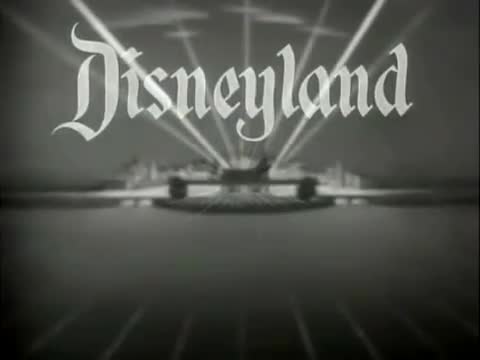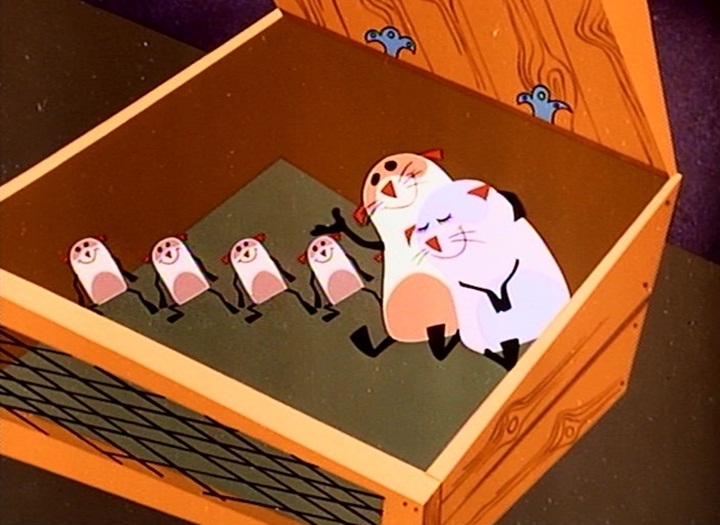
August has been 1954 Month here at the Film Experience, and it now falls upon me to share with you the animation of that year. And man, it was a weird 'un. The important place to start is noting that in '54, Walt Disney - the man, not the multinational entertainment corporation - was massively obsessed with the creation of his brand-new theme park out in California, and the brand-new television show on ABC that shared its name and served as the new funnel for all his creative and commercial instincts.
With Disney - the multinational entertainment corporation, not the man - thus a bit rudderless, there was a void in American animation like there hadn't been since Mickey Mouse's 1928 debut, basically. Disney itself was beginning to experiment with form in ways that Walt did not approve of, since Walt wasn't paying attention anymore, and the result was things like the Oscar-nominated short Pigs Is Pigs, one of the very weirdest shorts in the studio's history.
It's a little rhyming comedy about the misfortunes of a railway agent named Flannery who becomes overwhelmed by an explosion of interbreeding guinea pigs (the interbreeding is only implied, but this is still basically a short cartoon on the theme "y'know, guinea pigs sure do like to screw"). And it's in a strange hybrid style of Disney's traditional aesthetic and the studio's former employees and present competitors over at UPA.
You can find the short without too much effort online - I won't link to it, since things with a Disney copyright have a tendency not to stay at one URL too long - but I'm going to skip away from it now, because as marvelously odd as it is, what I'd really like to draw your attention to are a pair of 1954 animated features. Among the reasons for that is the very phrase "a pair of animated features", since this is only the third time in history an English-langauge audience would have had reason to pull that out, and the first time that Disney wouldn't have entered into the equation.
Indeed, Hansel and Gretel: An Opera Fantasy, distributed by the fading RKO, was nothing less than the first American-made animated feature made by someone other than Disney since 1941's Mr. Bug Goes to Town. It's loosely condensed from the 1893 folk music opera by Engelbert Humperdinck that tends to show up as the "family-friendly" option in an opera company's season right around Christmas. And that's much the same fate that befell the movie: after failing to make an impression in an anemic theatrical release, it found its way to television, where it reliably showed up as holiday programming for a few decades.

Well-worn plot aside, the film is legitimately one of the most unique animated features ever made in the States (it does, however, greatly resemble much Eastern European animation of the same period). It's stop-motion, with the characters played by enormously detailed, realistic puppets, whose faces can flex in preposterously and maybe even unsettlingly nuanced ways. The "Uncanny Valley" is a phrase meant to be applied solely to computer animation, and the eerily too-much-like-human CGI figures who feel like shiny zombies as a result; what we have here is the only example I can name of the Uncanny Valley in stop-motion animation. Still, the design is tremendously impressive, and the craftsmanship unimpeachable. I have enormous reservations about the vocal performances, especially Constance Brigham's shrill performance of the titular children, but it's a fascinating enough rarity to otherwise get my full endorsement as well worth the 73 minutes it takes to watch (which the curious can do here).
We turn now to an even more unqualified landmark: the first English-language film for an explicitly adult audience, and the first commercially-released animated "British" feature, an adaptation of George Orwell's Animal Farm made by the studio Halas and Batchelor (named for its husband-and-wife founders). Those scare quotes around "British" are quite necessary; the film was made in Britain, mostly by Brits, but it was financed by the American C.I.A. Which I believe is another another "first", and possibly an "only".

It's the C.I.A. connection that explains the weirdness of the adaptation, which somehow contrives to make a piece of fervent anti-Communist propaganda even more anti-Communist. The ashen-faced sobriety of the book and its iconic final scene weren't enough; the movie needed a full-throated counter-revolution that gets tacked on in the last couple of minutes. It's as clear-cut an example as it possible to name of a message being forced onto a story for top-down political purposes, and of course it doesn't work. The sustained gravity and increasing darkness of the real story, which the filmmakers admirably translate from Orwell, aren't designed to support the unpersuasive new finale, so whatever merits it has as a poke in the eye of the Soviet Union (since the Cold War extended past 1955, those merits are apparently limited) are nothing compared to how badly it knocks the drama apart in the home stretch.

Still, the film has ample historical interest, and it's 95% of a great, visually appealing (if certainly less than perfectly smooth and polished) adaptation of one of the key works of 20th Century political satire. The title alone has guaranteed that the movie hasn't gone completely invisible in the 60+ years since its debut, but it's hardly a household title, and if only by virtue of being a cartoon for grown-ups decades ahead of when most of us probably assumed such things existed, it certainly deserves more prominence than it has tended to enjoy.
